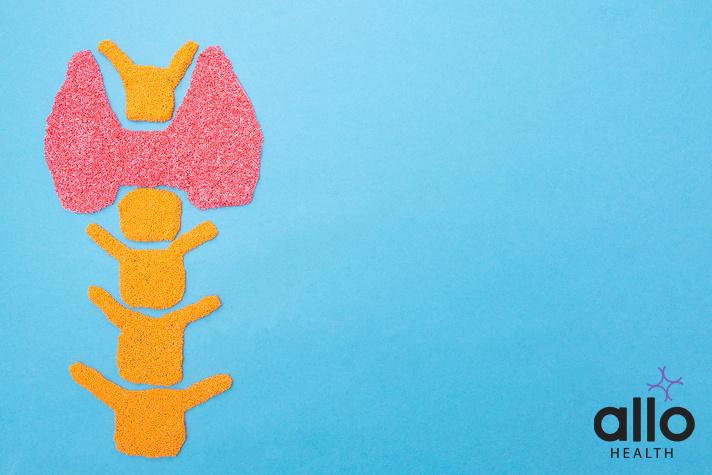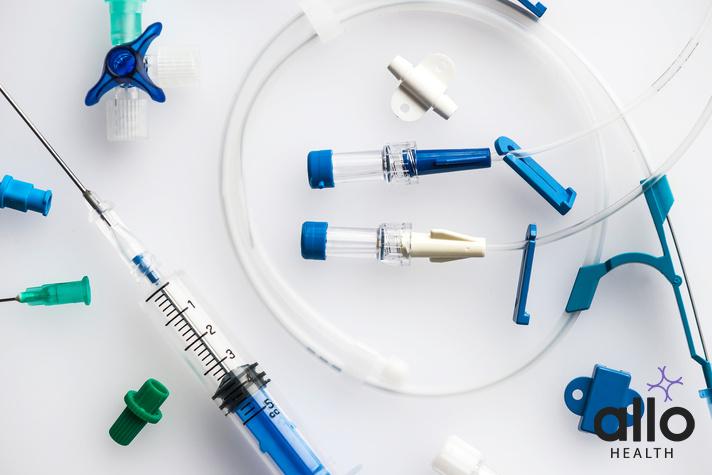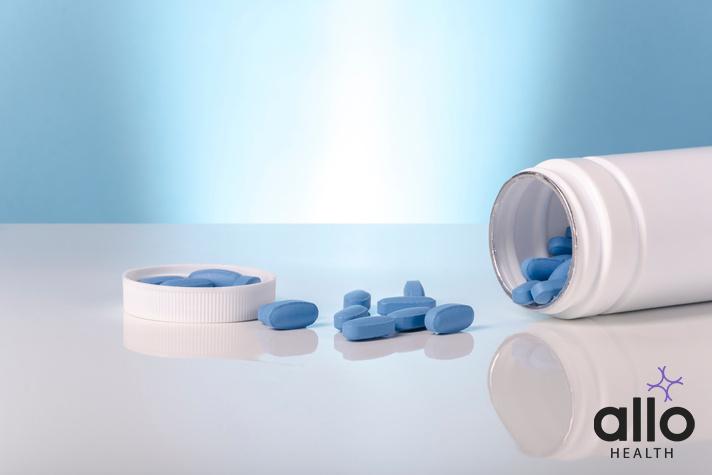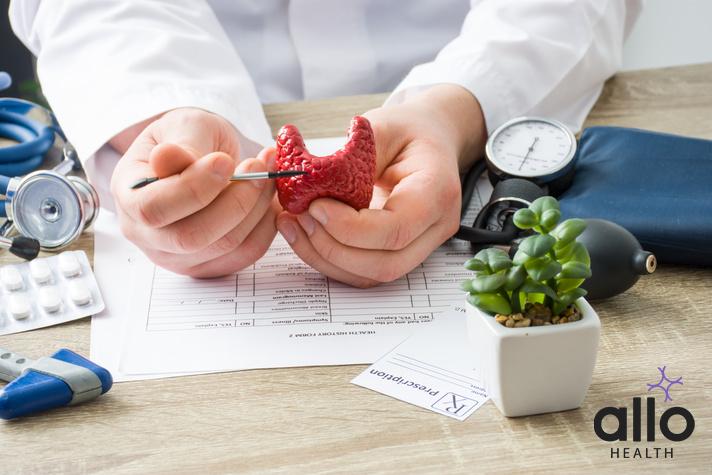What Is a TSH Test and Why Is It Important?

Allo Health is dedicated to personalized well-being, offering support and trusted information tailored to individual health goals. The platform emphasizes human-generated content, led by a distinguished medical team of experts, including physicians and sexual health specialists. Their commitment to credibility involves rigorous fact-checking, authoritative research, and continuous updates to ensure accurate, up-to-date information. Allo Health's unique approach goes beyond conventional platforms, providing expert-led insights and a continuous commitment to excellence, with user feedback playing a crucial role in shaping the platform's authoritative voice.

Dr. Raj. R holds an undergraduate medical degree from the Philippines, and has a bachelors background in Psychology. His experience working in the field of urology further brought his interest forward in working towards his passion of understanding the science of attraction, intimacy, sex and relationships. A key motto he practices by remains unprejudiced and non-judgemental care.
Why This Was Upated?
Our experts continually monitor the health and wellness space, and we update our articles when new information became available.
Updated on 03 January, 2024
- Article was updated as part of our commitment to diversity, equity, and inclusion.

"The following blog article may discuss medical treatments and interventions. However, it is important to note that the information provided is for general educational purposes only and should not be considered as a substitute for professional medical advice, diagnosis, or treatment. Always seek the guidance of a qualified healthcare professional for personalized medical advice.
Book consultation
Medical treatments are complex and should be tailored to individual circumstances. The information presented in this blog may not be applicable to everyone, as each person's medical condition, history, and needs are unique. Only a qualified healthcare professional can evaluate your specific medical situation, consider relevant factors, and provide appropriate recommendations for diagnosis, treatment options, and monitoring.
It is crucial to note that self-diagnosis, self-medication, or relying solely on the information provided in this blog for treatment decisions can have serious health consequences. "
If you’re having any concerns with your thyroid gland, chances are that you may have heard of a TSH test. This test is important in assessing the levels of thyroid hormones in your blood and helping to diagnose thyroid disorders.
In this in-depth article, we’ll explore everything you need to know about TSH tests including what they are, how they work, and why they’re important. So let’s dive right in!
Thyroid Hormones and Their Functions:
Before we delve into TSH testing, let’s look at the role of thyroid hormones in the body.
What is the thyroid gland? The thyroid gland is a small, butterfly-shaped organ located in your neck that produces two main hormones: thyroxine (T4) and triiodothyronine (T3). These hormones control your body’s metabolism, affecting everything from your heart rate and body temperature to your energy levels and weight.
Thyroid hormones also play a role in the development and functioning of the brain and nervous system.
In infants and young children, thyroid hormones are essential for proper growth and development of the brain and body.
In adults, they help to maintain cognitive function and mood stability. Additionally, thyroid hormones are involved in the regulation of the menstrual cycle and fertility in women.
The Role of TSH in Thyroid Function:
TSH, or thyroid-stimulating hormone, is produced by the pituitary gland in your brain and plays an important role in regulating thyroid hormone production.
High levels of TSH signal to the thyroid gland to produce more thyroid hormones, while low levels signal the opposite. This feedback loop is essential in maintaining equilibrium in the body.
But certain medical conditions can disrupt this delicate balance.
For example, an underactive thyroid gland may not produce enough thyroid hormones, leading to high levels of TSH as the pituitary gland tries to compensate.
In contrast, an overactive thyroid gland may produce too much thyroid hormone, causing low levels of TSH.
In both cases, this can result in a range of symptoms and health concerns, such as fatigue, weight gain or loss, and mood changes. Therefore, it is advised to monitor TSH levels and thyroid function regularly to ensure optimal health.
How a TSH Test Is Performed:

A TSH test is a simple blood test that measures the amount of thyroid-stimulating hormone in your bloodstream. The test involves:
- Taking a small blood sample from your arm
- And then, sending it off to a laboratory for analysis.
- Your doctor may order a TSH test as a standalone test or as part of a broader thyroid panel.
Interpreting TSH Test Results: Normal vs. Abnormal
Interpreting your TSH test results is crucial in understanding your thyroid health. A normal TSH level ranges between 0.4 and 4.0 milli-international units per litre (mIU/L). If your TSH level falls within this normal range, it typically means that your thyroid gland is functioning correctly. However, if your TSH level is outside this normal range, it could indicate a thyroid disorder.
TSH levels can vary throughout the day and may be affected by certain medications or medical conditions. Therefore, have your TSH levels tested at the same time of day and to inform your healthcare provider of any medications or medical conditions that may affect the results.
If your TSH level is found to be abnormal, further testing may be necessary to determine the cause of the abnormality.
This may include additional blood tests, imaging tests, or a biopsy of the thyroid gland. Treatment options for thyroid disorders vary depending on the specific condition and may include medication, surgery, or radioactive iodine therapy.
The Link Between TSH Levels and Hypothyroidism
Hypothyroidism occurs when your thyroid gland doesn’t produce enough thyroid hormones (primary hypothyroidism), leading to a slowed metabolism.
High TSH levels are often an indicator of hypothyroidism, as the pituitary gland produces more TSH in an effort to stimulate thyroid hormone production.
Other symptoms of hypothyroidism include:
- Fatigue
- Weight gain
- Constipation
- Dry skin.
While high TSH levels are a common indicator of hypothyroidism, they are not always a definitive diagnosis. Other factors, such as medications or underlying medical conditions, can also affect TSH levels. Therefore, consult with a healthcare professional for proper diagnosis and treatment of hypothyroidism.
Hypothyroidism Symptoms and Diagnosis:
Some common symptoms of hypothyroidism include:
- Fatigue
- Weight gain
- Cold intolerance
- Dry skin
- Hair loss.
However, these symptoms can also be caused by other medical conditions
Diagnosing hypothyroidism typically involves a combination of 3 things:
- TSH testing
- Physical exams
- Patient history evaluation.
Your doctor may also order additional blood tests, such as tests for thyroid antibodies, to confirm your diagnosis.
Treating Hypothyroidism with Medications and Lifestyle Changes

Treating hypothyroidism usually involves medications like levothyroxine, a synthetic form of T4, which helps to replace the missing thyroid hormones in your body.
Additional lifestyle changes like dietary adjustments and exercise can also play a role in managing hypothyroidism.
Medication dosage may need to be adjusted over time, as the body’s needs change. Regular blood tests and check-ins with a healthcare provider can help ensure that the medication is working effectively.
Certain dietary changes, such as increasing iodine intake, may also be recommended. Exercise can also help to improve symptoms of hypothyroidism, as it can boost metabolism and energy levels.
The Link Between TSH Levels and Hyperthyroidism
Hyperthyroidism, on the other hand, occurs when your thyroid gland produces too many thyroid hormones, leading to a hyperactive metabolism.
Low TSH levels are often an indicator of hyperthyroidism, as the pituitary gland produces less TSH in response to elevated thyroid hormone levels.
There are several potential causes of hyperthyroidism, including Graves’ disease, toxic nodular goiter, and thyroiditis.
Graves’ disease is an autoimmune disorder that causes the thyroid gland to produce too much thyroid hormone, while toxic nodular goiter is a condition in which thyroid nodules produce excess thyroid hormone.
Thyroiditis, on the other hand, is an inflammation of the thyroid gland that can cause temporary hyperthyroidism.
Treatment for hyperthyroidism may include medications to block the production of thyroid hormone, radioactive iodine therapy to destroy thyroid cells, or surgery to remove the thyroid gland.
In some cases, hyperthyroidism may resolve on its own without treatment.
Hyperthyroidism Symptoms and Diagnosis:
Hyperthyroidism is a condition in which the thyroid gland produces too much thyroid hormone, leading to a variety of symptoms. Symptoms of hyperthyroidism include:
- Weight loss
- Increased appetite
- Anxiety
- Irritability
- Difficulty sleeping
- Slow heart rate
- In some cases, hyperthyroidism can also cause heart palpitations, tremors, and muscle weakness.
Diagnosing hyperthyroidism typically involves a combination of
- TSH testing
- Physical exams
- Patient history evaluation.
Additional tests like thyroid hormone level tests and thyroid scans may also be necessary to confirm your diagnosis.
If left untreated, hyperthyroidism can lead to serious complications such as osteoporosis, heart problems, and even thyroid storm, a life-threatening condition.
Treating Hyperthyroidism with Medications, Surgery, or Radioactive Iodine Therapy

Treating hyperthyroidism may involve medications like beta blockers, which help to reduce the symptoms of hyperthyroidism.
Surgery or radioactive iodine therapy may be necessary to remove or reduce the activity of the thyroid gland.
Your doctor will recommend the best treatment option based on your medical history and the severity of your condition.
Medication may not be a permanent solution for hyperthyroidism. In some cases, the condition may return after the medication is stopped. Surgery or radioactive iodine therapy, on the other hand, may provide a more permanent solution by removing or reducing the activity of the thyroid gland.
Discuss the potential risks and benefits of each treatment option with your doctor. For example, surgery may carry risks such as bleeding or infection, while radioactive iodine therapy may increase the risk of developing other thyroid conditions in the future.
Your doctor can help you weigh the pros and cons of each treatment option to make an informed decision about your care.
Other Conditions That Affect TSH Levels
While thyroid disorders are the most common cause of abnormal TSH levels, other conditions can also affect TSH levels in your blood. These conditions include:
- Pregnancy
- Pituitary gland disorders
- Administering certain medications like steroids or chemotherapy drugs.
Pregnancy can cause changes in TSH levels due to the increased demand for thyroid hormones during fetal development. This can lead to a decrease than normal levels in TSH during the first trimester, followed by an increase in the second and third trimesters.
Pituitary gland disorders, such as a pituitary tumor or damage to the pituitary gland, can also affect TSH levels. In some cases, these disorders can cause an increase in TSH levels, while in others, they can cause a decrease.
When to Get Tested for TSH
- If you’re experiencing symptoms of hypothyroidism or hyperthyroidism
- Your doctor may recommend a TSH test include monitoring the effectiveness of thyroid medications or diagnosing thyroid cancer.
- It’s also recommended that pregnant women get tested for TSH, as thyroid hormone levels can affect the development of the fetus.
- Individuals with a family history of thyroid disorders or autoimmune diseases may be advised to get tested as a precautionary measure.
Preparing for a TSH Test: What To Expect
Before your TSH test, your doctor may give you specific instructions on fasting or avoiding certain medications that could affect your results. Be sure to follow their advice carefully to ensure accurate results.
In addition to following your doctor’s instructions, it’s important to stay hydrated before your TSH test. Drinking plenty of water can help ensure that your veins are easy to find, which can make the blood draw process quicker and less painful.
It’s also a good idea to wear comfortable clothing on the day of your TSH test. This can help you feel more relaxed and at ease during the procedure, which can make the experience less stressful overall.
Common Misconceptions About TSH Testing
There are a few misconceptions about TSH testing that are worth addressing.
For example, some people believe that a TSH test can diagnose all thyroid disorders, but this isn’t entirely true. Most people with hyperthyroidism will also need additional tests to confirm their diagnosis.
At the same time, a TSH test isn’t always necessary for diagnosing thyroid disorders, particularly in cases where symptoms are mild or the patient has other health conditions that could interfere with the results.
Another common misconception is that a TSH test can accurately diagnose thyroid cancer. While abnormal TSH levels can be a sign of thyroid cancer, a biopsy is needed to confirm the diagnosis.
TSH levels can fluctuate throughout the day and can be affected by factors such as stress and medication. Therefore, discuss any medications or supplements you are taking with your healthcare provider before getting a TSH test.
Final Words
The thyroid-stimulating hormone (TSH) test is essential in assessing thyroid hormone levels and diagnosing thyroid disorders.
TSH, produced by the pituitary gland, regulates thyroid hormone production. Normal TSH levels range between 0.4 to 4.0 milli-international units per litre (mIU/L).
Abnormal levels may indicate hypothyroidism (high TSH) or hyperthyroidism (low TSH), requiring further tests and potential treatments like medication or surgery.
Other factors, such as medications and pregnancy, can also affect TSH levels.
Consulting a healthcare professional for accurate interpretation and diagnosis is crucial.
Frequently Asked Questions
Q: What is a TSH test?
A: A TSH test measures the level of thyroid-stimulating hormone (TSH) in the blood. TSH is produced by the pituitary gland and plays a crucial role in regulating thyroid hormone production.
Q: What are the reference range for TSH levels?
A: The reference range for TSH levels is typically 0.4 to 4.0 mIU/L (or μIU/mL). The upper limit is around 4.0 mIU/L, and the lower limit is approximately 0.4 mIU/L.
Q: Can a TSH test diagnose thyroid cancer?
A: A TSH test alone cannot diagnose thyroid cancer. Abnormal TSH levels may indicate the need for further investigation, such as a biopsy, to confirm the diagnosis.
Q: Can TSH levels fluctuate?
A: Yes, TSH levels can vary throughout the day and may be affected by factors such as stress, medications, and other health conditions. For accurate results, TSH tests are often done at the same time of day and under consistent conditions.






































